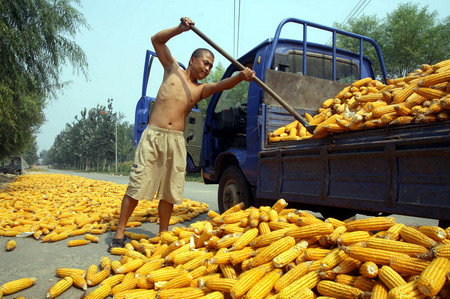Economy
Limits set on processors' corn purchases
By William Bi (China Daily)
Updated: 2011-04-19 13:54
 |
Large Medium Small |
|
 |
|
A man pushes harvested corn off his truck onto the street outside of Beijing. Industrial use of corn this year through Sept 30 may jump 11 percent to 50 million tons, or about 29 percent of China's total consumption, according to a forecast by China National Grain and Oils Information Center. [Photo / Bloomberg News] |
BEIJING - China, the second-biggest corn user, is taking steps to limit consumption in the biochemical and sweetener industry to ensure supply for livestock farmers, said three people who received a government document on the matter.
Processors will be barred from buying more corn than their consumption level in 2009 and the government will increase value-added taxes on corn-based products, said the people, who declined to be identified as the information isn't public.
China's demand for corn-derived products, ranging from pharmaceutical supplies to alcohol and sweetener in beverages, is outpacing growth in livestock consumption. The introduction of tightening measures showed the country's demand for corn has exceeded production, underlying growing needs for imports, according to Wanda Futures Co.
|
||||
Financial institutions were ordered to stop providing companies with loans to purchase corn until the end of June, according to the document, dated April 8, cited by the people.
Increased surveillance
The government will increase surveillance of large companies to ensure their operations conform with directives, and local authorities were ordered to root out processors with small or inefficient operations, they said. The government will stop accepting new license applications for buying grain, they said.
Large industrial processors anticipated the tightening moves and stocked up on supplies, Wang said. As of April 5, companies and traders bought 74 million metric tons of corn in major production regions, more than twice the amount in the same period last year, according to data by the State Administration of Grain. The data indicate supply is mostly in the hands of traders and little is held by farmers, Wang said.
Industrial corn processors such as State-owned China National Cereals, Oils and Foodstuffs Corporation (COFCO) Ltd, often outbid livestock farmers because they profit more from the grain they buy, Wang Licai, vice-chairman of the China Starch Industry Association, said on March 16.
Industrial use
Industrial use of corn this year through Sept 30 may jump 11 percent to 50 million tons, or about 29 percent of China's total consumption, according to a forecast by China National Grain & Oils Information Center. Livestock feed demand will grow by 6 percent to 105 million tons, 61 percent of the total, the center's data show.
Whether the nation's consumption can be met without more imports also depends on the prospects for this year's crop, which is expected to be planted this month, Wanda Futures' Wang said. "Any production snags will likely force the country to buy at all costs, probably in the form of more state purchases," he said.
China's State reserve managers are believed to have bought 1 million tons of US corn last month, when prices plunged following the earthquake in Japan, Wang said.
A call to Li Pumin, deputy secretary-general of the National Development and Reform Commission, the top economic planning agency, was not answered.
Bloomberg News
| 分享按钮 |



